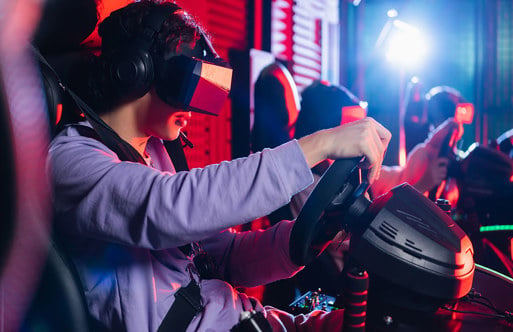The gaming industry is changing, and it's changing fast, writes Buddhika Jayasingha, an IT specialist at Future Fish.
As we look at the history of gaming, we can see how far it's come in a relatively short period of time. People played games with 8-bit graphics and two colours only a few decades ago. Now, we have incredibly realistic graphics, a wide variety of genres, and millions of games to choose from. With modern gaming taking advantage of advancements in cloud, augmented reality (AR), artificial intelligence (AI) and the Metaverse, it's time to look in more detail at the impact and influence of new and emerging technologies on the gaming world.
Cloud gaming
As graphics for games continue to push the boundaries of realism with features like 4K HDR, consoles struggle to keep up, often falling short in terms of frame rates and overall performance. Even the latest consoles, like the PS5, face challenges in delivering the highest quality gaming experience. On the other hand, PC gamers must continuously upgrade their hardware, such as graphics cards, to maintain the desired performance levels and enjoy new games in their intended settings.
This is where cloud gaming shines, allowing users to stream high-quality games without needing a high-end device or worrying about hardware upgrades. Much like Netflix revolutionised the way we watch TV shows and movies, cloud gaming is transforming the gaming experience with subscription-based services such as Xbox Game Pass and PlayStation Plus Premium. These services are not only making gaming more accessible but are also changing the way console-exclusive games are consumed. With more console games becoming available for streaming, it's clear that cloud gaming is an important trend in shaping the industry; Sony could even implement built-in cloud gaming apps on their TVs, much like other entertainment apps, further expanding their reach.
Cloud gaming eliminates the need to bother with settings and hardware upgrades, providing the freedom and simplicity that consoles once offered. All that's required is a stable internet connection, allowing gamers to switch on and play. Moreover, the evolution of game streaming devices like the Nvidia Shield has led to better and more diverse options for gamers interested in cloud gaming. As these devices continue to improve, they drive further innovation in the gaming industry, making high-quality gaming experiences more accessible and convenient than ever before.
Portable gaming devices
The success of the Nintendo Switch has highlighted the growing demand for portable gaming devices that enable gamers to enjoy their favourite games wherever they go. As technology advances, we can anticipate the emergence of more portable gaming devices that seamlessly combine home consoles' power with mobile gaming's convenience. Furthermore, with Nintendo aiming to surpass the 19 million unit mark in Nintendo Switch sales in 2023, it's evident that portable gaming is profitable. As a result, it has a significant role in the gaming industry's future.
Introducing devices like the Steam Deck has further propelled AAA handheld gaming into the mainstream. The undeniable convenience these devices offer consumers is a significant factor in their growing popularity. Companies constantly compete for consumer attention, and providing a convenient gaming experience is a sure-fire way to stand out.
CES 2023 showcased a variety of innovative portable devices, further emphasizing the trend toward convenient gaming options. The Logitech G Cloud, an Android-based cloud gaming system, offers users a highly comfortable gaming experience. Another notable device is Razer's cloud-based handheld, which features a 5G version for even greater connectivity. Pimax Portal, roughly the size of the Nintendo Switch Lite, comes with Joy-Con-style controllers, making it a strong competitor in the portable gaming market. The magnetic snap of the controllers adds a sense of quality and sturdiness to the Portal, ensuring its durability for on-the-go gaming. More importantly, its ability to function as a VR device elevates the 'docked' mode experience to a whole new level.
These advancements in portable gaming devices demonstrate the industry's commitment to providing gamers with powerful, convenient, and versatile options, further solidifying the bright future of handheld gaming.
The rise of free-to-play games
Free-to-play games have grown tremendously in recent years due to their profitable in-game purchasing models and accessibility. As more developers adopt this approach, free-to-play games will begin to outperform traditional paid games in terms of popularity and revenue.
The rise of mobile gaming has also contributed to the popularity of free-to-play games, as they are often designed with mobile devices in mind. This makes them more accessible to a broader audience, which in turn drives their success. Additionally, free-to-play games usually have a social aspect that encourages players to invite friends and family to play with them, further increasing their reach and popularity. The growing popularity of free-to-play games can also be attributed to their ease of use, as players can download and start playing without any upfront cost.
As the gaming industry evolves, we can expect to see even more free-to-play games emerge, catering to various preferences and interests. This shift will likely lead to further innovation in the way games are developed and monetised, ultimately shaping the future of gaming.
AI in non-player characters
Integrating AI into a Non-Player Character (NPC) can significantly enhance the gaming experience, enabling more realistic and dynamic interactions. In addition, as AI technology advances, we can expect to see NPCs that adapt to players' behaviours, making gameplay more engaging and personalised.
With discussions ongoing about the potential applications of new AI models, it's worth noting that the video game industry stands to gain significantly from these advancements. The future of AI in gaming is undoubtedly promising, and we anticipate a remarkable transformation in NPC quality across both AAA and indie studios in the next five years. As more industry players experiment with AI technology, we can expect to see an evolution in character development, innovative game mechanics, and more immersive game worlds.
The possibilities for the future use of AI and NPCs in gaming are virtually limitless. Based on NPC decision-making, players can anticipate storylines that dynamically change with branching paths. Additionally, players can enjoy personalised experiences that are specifically tailored to their individual preferences, creating a more engaging and immersive gaming experience.
Unreal Engine 5: A glimpse into the future of game development
Unreal Engine 5 will propel the gaming industry into the future for developers and players by offering ground-breaking features that elevate graphics, detail, and accessibility. Key advancements that will shape the future of game development with Unreal Engine 5 include:
- Next-generation lighting
The cutting-edge Lumen system will enable real-time rendering of dynamic global illumination and reflections, paving the way for unparalleled realism in virtual environments. - Adaptive level of detail
The Nanite feature will revolutionise scene management by automatically adjusting polygon counts for objects as they move away from the camera, streamlining scenes and reducing developers' workloads. - Expansive asset library
The Megascans library, in partnership with Quixel, will continue to grow, offering an ever-expanding collection of assets, advanced 3D scanning capabilities, and realistic human creation through Metahumans. - Leveraging emerging hardware technology
As hardware advancements continue, Unreal Engine 5 will adapt and optimise to capitalise on next-generation storage solutions, further reducing loading times and promptly loading visual assets. - Seamless compatibility
Unreal Engine 5 will evolve to ensure smooth conversion from previous iterations, enabling developers to upgrade their games or create sequels with minimal effort as technology advances. - Democratising game development
By remaining accessible for developers with less than $1 million in revenue, Unreal Engine 5 will foster innovation and growth within the indie game development community.
By embracing the power of new hardware and offering advanced features, Unreal Engine 5 will serve as a driving force for the future of game development, enabling the creation of strikingly realistic, high-quality games that blur the lines between the virtual and real worlds.
Transforming the gaming landscape with AR & VR
Virtual reality (VR) and augmented reality (AR) have been two of the most significant advancements in gaming technology in recent years. The potential of AR technology is practically limitless. With interactive board games and virtual scavenger hunts, AR allows players to immerse themselves in extraordinary worlds.
The world of VR gaming is already a thriving industry, with Meta's Quest 2 headsets surpassing the sales of Xbox Series X consoles. Games like Beat Saber have also demonstrated their profitability. AR encompasses various applications, such as Pokémon Go. Apple's widespread distribution of LiDAR sensors across millions of devices worldwide and the imminent release of their headset could pave the way for a breakthrough in 2023.
VR has quite promising potential for growth. According to research by Newzoo, the number of active VR installations is increasing at a faster pace than ever before, projected to grow from 27.7 million this year to 46.0 million by the end of 2024.
As technology continues to evolve, AR and VR gaming will play an increasingly important role in shaping the gaming industry's future, offering players immersive and interactive experiences unlike anything seen before.
The Metaverse and role-playing games
As the Metaverse continues to develop, we can expect a closer integration between role-playing games (RPGs) and the virtual worlds they inhabit. In addition, the Metaverse offers vast, interconnected digital spaces where players can engage in cross-platform social experiences, blurring the lines between traditional RPGs and immersive online environments.
The Metaverse is expected to play a significant role in the future of gaming, as it will allow players to experience games in an entirely new way. This will be particularly true for RPGs, which are often set in fantasy or science fiction worlds and allow players to explore these worlds and interact with other players. These games will become even more engaging as they become part of the broader metaverse experience. Within the Metaverse, RPGs will achieve unprecedented levels of immersion. Players can craft their own characters and environments while engaging with other players in real-time interactions. This heightened level of immersion will enable players to become fully absorbed in the game world, resulting in a significantly enhanced gaming experience.
The integration of RPGs into the Metaverse will likely lead to the creation of rich, expansive virtual worlds that offer endless opportunities for exploration, interaction, and storytelling. Furthermore, as the lines between gaming and social experiences become more blurred, we anticipate a future where RPGs and the Metaverse become inextricably linked, providing players with unprecedented levels of immersion and engagement in their gaming experiences.
Predictions and challenges
As the gaming industry evolves, driven by the ongoing impact of cutting-edge technologies and trends, several notable advancements are anticipated in the near future. For example, incorporating AI and machine learning can offer highly customised gaming experiences, adapting content and challenge levels to each player's preferences. Furthermore, as AR and VR technologies progress, the distinction between the real and digital worlds may become increasingly indistinct, giving rise to unparalleled gaming experiences that seamlessly merge aspects from both domains.
For you
Be part of something bigger, join BCS, The Chartered Institute for IT.
However, the gaming industry will likely face several challenges in adopting and implementing these advancements. Ensuring data privacy and security will be crucial, particularly as more personal information is collected and utilised to create customised experiences. Furthermore, the increasing complexity of game development may lead to higher development costs and extended production timelines. Addressing the digital divide and ensuring that gaming experiences are accessible to people with different levels of technology and connectivity will also be a significant concern. By anticipating and addressing these challenges, the gaming industry can continue to evolve and push the boundaries of what's possible, providing players with increasingly immersive and engaging experiences.
A bright future
The future of gaming is brimming with potential as advancements in cloud gaming, portable gaming devices, AI, AR/VR, free-to-play models, and the Metaverse continue to redefine the industry. As we witness the integration of these ground-breaking technologies and trends, we can expect a profound transformation of gaming experiences that cater to diverse preferences and interests. In the years to come, gamers can look forward to an exciting and innovative era as the boundaries of what was once thought possible in gaming continue to be pushed further than ever before.
As the gaming environment transforms, it will be marked by enhanced accessibility, ease of use, and immersive experiences, enabling players to interact and connect with one another in ways never before possible. However, the industry must also address challenges such as data privacy, security, rising development costs, and bridging the digital divide, to ensure a successful future. By anticipating and overcoming these obstacles, the gaming industry can create immersive and engaging experiences that blur the lines between the virtual and real worlds, providing players with unforgettable experiences that redefine the boundaries of gaming.
Further reading
- Sensor Tower: Pokémon GO Catches $6 Billion in Lifetime Player Spending
- The Verge: Microsoft says more than 20 million people have used Xbox Cloud Gaming
- PC Mag: Nvidia's GeForce Now Game-Streaming Service Tops 20 Million Users
- Markets and Markets: Cloud Gaming Market
- Statista: Free-to-play (F2P) mobile games market revenue worldwide from 2018 to 2023
- Activision Blizzard: Activision Blizzard Announces Fourth-Quarter and 2021 Financial Results
- Games Industry.biz: Nintendo reportedly planning to increase Switch production in 2023
- 2CV: CES 2023: The Future is Portable
- What HiFi: The big problem with 4K gaming – and why it won't change any time soon
- NewZoo: VR Games Market Report: An Overview and Outlook of Virtual Reality in Games and Beyond
- Forbes: How The Games Industry Can Leverage Advances In AI To Revolutionize NPCs
- Digiday: Why gamers are flocking from premium titles to free-to-play, ad-supported games in this unstable economy
- Unreal engine: Game engine - Build Multi-platform video games

















